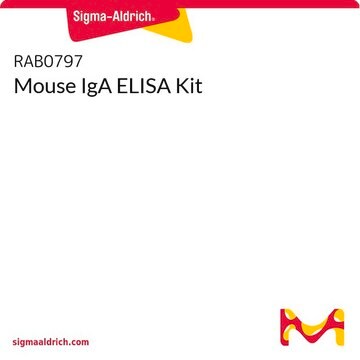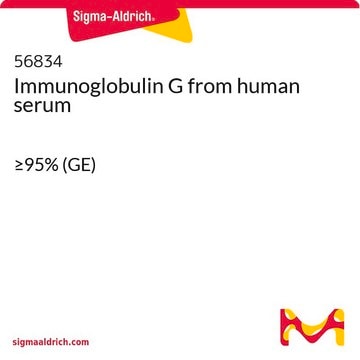RAB0806
Mouse IgM ELISA Kit
Synonym(s):
IgM, Immunoglobulin M
Sign Into View Organizational & Contract Pricing
All Photos(1)
About This Item
UNSPSC Code:
41116158
NACRES:
NA.32
Recommended Products
species reactivity
mouse
technique(s)
ELISA: suitable
assay range
inter-assay cv: <10%
intra-assay cv: <12%
shipped in
wet ice
storage temp.
−20°C
General description
Immunoglobulin M (IgM) is a highly conserved antibody in vertebrates and shows early expression during the immune response. Peritoneal B cells secrete IgM and it exists as a pentamer. IgM plays a key role in engulfing the apoptotic cells. A reduction in the serum IgM levels leads to an increase in autoimmune response and a higher risk for infections. IgM displays polyreactive and autoreactive functionality. It plays a key role in tissue homeostasis by mediating the clearance of tissue-based molecules. The antibody pair provided in this kit recognizes mouse IgM.
Application
For research use only. Not for use in diagnostic procedures.
Please refer to the attached General ELISA KIT Procedure (sandwich, competitive & Indirect ELISA)
Please refer to the attached General ELISA KIT Procedure (sandwich, competitive & Indirect ELISA)
Signal Word
Warning
Hazard Statements
Precautionary Statements
Hazard Classifications
Met. Corr. 1
Storage Class Code
8A - Combustible corrosive hazardous materials
Flash Point(F)
Not applicable
Flash Point(C)
Not applicable
Certificates of Analysis (COA)
Search for Certificates of Analysis (COA) by entering the products Lot/Batch Number. Lot and Batch Numbers can be found on a product’s label following the words ‘Lot’ or ‘Batch’.
Already Own This Product?
Find documentation for the products that you have recently purchased in the Document Library.
Lori Broderick et al.
Nature communications, 10(1), 3644-3644 (2019-08-15)
B cell development is a highly regulated process involving multiple differentiation steps, yet many details regarding this pathway remain unknown. Sequencing of patients with B cell-restricted immunodeficiency reveals autosomal dominant mutations in TOP2B. TOP2B encodes a type II topoisomerase, an
Stefan Malafa et al.
PLoS neglected tropical diseases, 14(2), e0008034-e0008034 (2020-02-06)
Zika virus has recently spread to South- and Central America, causing congenital birth defects and neurological complications. Many people at risk are flavivirus pre-immune due to prior infections with other flaviviruses (e.g. dengue virus) or flavivirus vaccinations. Since pre-existing cross-reactive
A A R Thompson et al.
Science immunology, 2(8) (2017-04-08)
Hypoxia and bacterial infection frequently co-exist, in both acute and chronic clinical settings, and typically result in adverse clinical outcomes. To ameliorate this morbidity, we investigated the interaction between hypoxia and the host response. In the context of acute hypoxia
Lorenzo E Hernández-Castellano et al.
Journal of dairy science, 102(9), 8478-8485 (2019-07-01)
Several physiological and metabolic changes take place in dairy ruminants around parturition (late pregnancy, parturition, and early lactation). Dairy species are genetically selected for their higher milk production compared with non-dairy species. This fact causes a constant stress that impairs
Simon A Reid et al.
BMC public health, 17(1), 671-671 (2017-08-24)
Zoonotic diseases such as leptospirosis occur as a result of the often complex interactions that exist at the human-animal-environment interface. The most obvious consequence of this complexity is the need for the health sector to partner with institutions in other
Our team of scientists has experience in all areas of research including Life Science, Material Science, Chemical Synthesis, Chromatography, Analytical and many others.
Contact Technical Service









